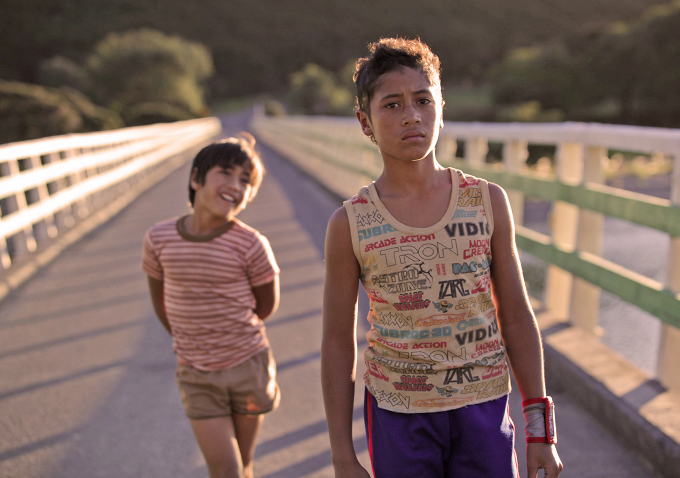
Taika Waititi’s whimsical, sophomore effort “Boy” is a coming-of age tale that drops us into 1984, and follows the titular Boy (James Rolleston), named after his absentee father, Alamein (Waititi). He lives with his grandmother, younger brother Rocky (Te Aho Aho Eketone-Whitu) and four cousins who act as adorable window dressing around their rundown farm. When his grandmother leaves for a funeral, Alamein — newly freed from prison — returns to their home with two hooligans in tow to crash, with plans to find a pile of money he buried years earlier. Meanwhile, Boy hopes that with his father back in his life, he will take them away and they can be a family.
The humor that Waititi wields is clear if you're familiar with his first film "Eagle vs. Shark," but more so from his contributions to the cult hit "The Flight of the Conchords." Boy's introduction to the viewer (and his class) is through a streaming monologue about his love of Michael Jackson, Rocky possibly having super powers and how his father is the best at everything from rugby to deep sea fishing. The jump-cut style jokes are misleading though, as "Boy" slows down after that introduction, becoming more than just a series of YouTube-ready skits.
 That's not to say there aren't viral moments — Waititi struts his stuff in three homages to the King of Pop — but they're distributed throughout 88 minutes that breeze past. However, there are some cultural aspects that might fly over audiences' heads, since Waititi dives into Maori culture with little context for those who might be unfamiliar with it. In some ways, "Boy" is the less depressing version of Lee Tamahori's "Once Were Warriors," which explored modern life for the Maori in New Zealand as bleak, violent and broken. Whereas many films depicting Maori culture focus on amoral bruisers or thugs, Waititi highlights the reality of the false machismo that he grew up with. He keeps Alamein dressed as if he were a leather jacket-wearing bad-ass with a mustache, yet physically he's a lanky goofball. From high kicks to awkwardly crawling into his car through the window, he clearly displays the dissonance between Boy's childhood idolization and the actual reality of who he is.
That's not to say there aren't viral moments — Waititi struts his stuff in three homages to the King of Pop — but they're distributed throughout 88 minutes that breeze past. However, there are some cultural aspects that might fly over audiences' heads, since Waititi dives into Maori culture with little context for those who might be unfamiliar with it. In some ways, "Boy" is the less depressing version of Lee Tamahori's "Once Were Warriors," which explored modern life for the Maori in New Zealand as bleak, violent and broken. Whereas many films depicting Maori culture focus on amoral bruisers or thugs, Waititi highlights the reality of the false machismo that he grew up with. He keeps Alamein dressed as if he were a leather jacket-wearing bad-ass with a mustache, yet physically he's a lanky goofball. From high kicks to awkwardly crawling into his car through the window, he clearly displays the dissonance between Boy's childhood idolization and the actual reality of who he is.
But the cultural touches can be ignored as they don't really affect the family story that Waititi unfurls on screen; pop culture, however, is a different matter. The director gives us way too many references to the 80s ranging from the obvious ("How's it having a dad like the Incredible Hulk?") to the subtle (the Charger Alamein drives is familiar to anyone who’s seen “The Road Warrior”). These nods even precede the decade, as Alamein adopts the name "Shogun" after reading a ratty copy of James Clavell's bestselling 1975 novel of the same name. It's a neat trick to keep the audience involved, just in case the Maori heritage is lost on them or if they can't get into the local patois, but it can be a bit much at times.
However, beneath the quirkiness and silliness of "Boy,” there's a legitimate artistic presence on display. Waititi wrote, produced, directed and starred in the film, which goes beyond it’s coming-of-age story structure, to become something much richer and deeper that still leaves a smile on your face. And stick around for the credits, because there is a homage to Michael Jackson's "Thriller" will keep you enthralled until the lights come up. [B]

